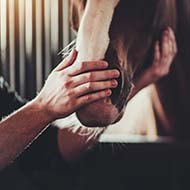
Tool will provide consistent ethical basis for the participation of equines in sport.
Representatives from the world of equestrian sport are today (4 October) convening an online workshop to test a new ethical framework developed by the Royal Veterinary College (RVC) and World Horse Welfare.
The workshop will help inform the second phase of the project, which aims to provide sporting disciplines with a consistent ethical basis for the participation of equines in sport and support the highest welfare standards.
The first phase of the project, which covered the theory and function of the ethical framework, was led by Dr Madeleine Campbell, senior lecturer in Human-Animal Interactions & Ethics at the RVC.
Today’s meeting will see Dr Campbell present the initial findings of the ethical framework and how it functions as a tool.
Bluebell Brown, the World Horse Welfare-funded MRes student on the project, will then explain how the framework was tested and refined through stakeholder participation. Finally, two stakeholders involved in this process will outline their experiences of it and how they envisage the framework being used in future.
“We are looking forward to testing this tool with further decision-makers across all levels of horse sport and we hope the workshop engages everyone in discussion around what exactly needs to be considered when making policies that can impact upon horse welfare,” commented Dr Campbell.
“The framework in itself does not tell any stakeholder what conclusion they ought to be reaching on any particular issue – it simply provides them with a logical method of reaching some conclusion based on a set of guiding principles. This means that the framework tool can be used in any setting within equestrian sport to facilitate the transparent, consistent justification of decision and policymaking.”
Dr Campbell will also lead phase two of the research, which focuses on optimising the function and uptake of the ethical framework tool. Beginning this month, phase two will continue over the next three years and aims to advance the framework's uptake across the equestrian sports sector.
“We are delighted to support this project into its 2nd phase, which aligns so closely with a key aspect of our 2020-2024 strategy: ‘Supporting the ethical involvement of equines in sport and entertainment,” said Roly Owers, chief executive officer at World Horse Welfare.
“As recent events such as the infamous Gordon Eliot photo and the treatment of horses during Modern Pentathlon at the Tokyo Olympics have shown, this work has never been more relevant and we are excited to be a part of this pioneering development.”



 The RCVS has announced a new version of its 1CPD mobile app, with enhanced features for veterinary surgeons and veterinary nurses to record their continuing professional development.
The RCVS has announced a new version of its 1CPD mobile app, with enhanced features for veterinary surgeons and veterinary nurses to record their continuing professional development.